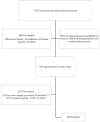Urinary Volatile Organic Compound Testing in Fast-Track Patients with Suspected Colorectal Cancer
- PMID: 35565258
- PMCID: PMC9099958
- DOI: 10.3390/cancers14092127
Urinary Volatile Organic Compound Testing in Fast-Track Patients with Suspected Colorectal Cancer
Abstract
Colorectal symptoms are common but only infrequently represent serious pathology, including colorectal cancer (CRC). A large number of invasive tests are presently performed for reassurance. We investigated the feasibility of urinary volatile organic compound (VOC) testing as a potential triage tool in patients fast-tracked for assessment for possible CRC. A prospective, multi-center, observational feasibility study was performed across three sites. Patients referred to NHS fast-track pathways for potential CRC provided a urine sample that underwent Gas Chromatography-Mass Spectrometry (GC-MS), Field Asymmetric Ion Mobility Spectrometry (FAIMS), and Selected Ion Flow Tube Mass Spectrometry (SIFT-MS) analysis. Patients underwent colonoscopy and/or CT colonography and were grouped as either CRC, adenomatous polyp(s), or controls to explore the diagnostic accuracy of VOC output data supported by an artificial neural network (ANN) model. 558 patients participated with 23 (4%) CRC diagnosed. 59% of colonoscopies and 86% of CT colonographies showed no abnormalities. Urinary VOC testing was feasible, acceptable to patients, and applicable within the clinical fast track pathway. GC-MS showed the highest clinical utility for CRC and polyp detection vs. controls (sensitivity = 0.878, specificity = 0.882, AUROC = 0.896) but it is labour intensive. Urinary VOC testing and analysis are feasible within NHS fast-track CRC pathways. Clinically meaningful differences between patients with cancer, polyps, or no pathology were identified suggesting VOC analysis may have future utility as a triage tool.
Keywords: colorectal cancer; fast track; volatile organic compounds.
Conflict of interest statement
The authors declare no conflict of interest. The funders had no role in the design of the study; in the collection, analyses, or interpretation of data; in the writing of the manuscript, or in the decision to publish the results.
Figures
References
-
- Jellema P., van der Windt D.A.W.M., Bruinvels D.J., Mallen C.D., van Weyenberg S.J.B., Mulder C.J., de Vet H.C.W. Value of symptoms and additional diagnostic tests for colorectal cancer in primary care: Systematic review and meta-analysis. BMJ. 2010;340:c1269. doi: 10.1136/bmj.c1269. - DOI - PMC - PubMed
-
- National Institue of Heath and Care Excellence. [(accessed on 5 October 2021)]. Available online: https://www.nice.org.uk/guidance/ng12/chapter/1-Recommendations-organise....
Grants and funding
LinkOut - more resources
Full Text Sources
Miscellaneous



